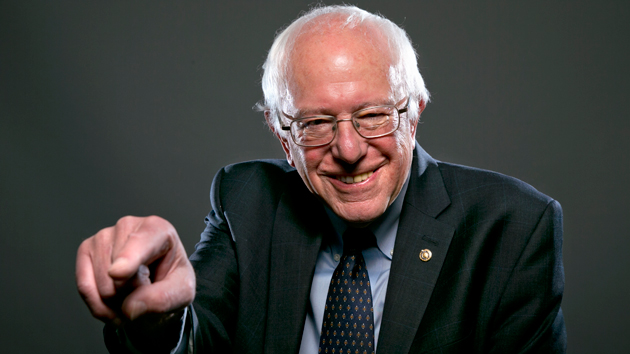The world is a country: The New York democratic primary

In the US election – as in African ones – there are large numbers of voters totally devoted to the establishment candidates. It is as though the downtrodden, unwilling to take responsibility for their own futures, settle for the hope that a greater amount of crumbs will trickle down to them from the master’s table.
The Italian saying, Tutto il mondo è paese, (meaning people are the same the world over), came to mind recently, as I struggled to follow the analyses of the New York Democratic primary election of 2016.
From the beginning of the cycle, Bernie Sanders has argued that the system whereby candidates depend on billionaire financiers to back their campaigns makes them beholden to special interests. He has been relentless in stating that existing global financial systems benefit only the top 1% of the population. Few knew before Sanders publicized Oxfam’s findings in 2014 that the richest 1% of the world own 48% of global wealth.
As with post-election revelations on the African continent, in New York there were allegations of ballot box fraud which included disenfranchisement of voters through late delivery of election materials, non-functional equipment, registered voters unable to find their names on the electoral register, voters’ registration details altered from one party to another and clear forgery of a voter’s signature in the register. At a guess, investigations would show the anomalies to be systemic rather than an aberration.
The result itself is in line with the polls; the front-runner, Hillary Clinton, prevailed over her challenger Bernie Sanders by 15 percentage points. Regardless of the predictions, Sanders’ supporters had hoped for a win. Polls have been wrong in the past, notably in the Michigan primary in which Sanders was expected to lose by nearly 20 percentage points but beat Clinton by 2%.
Sanders’ loss confounded massive turn-outs at his final three rallies in New York: crowds of between twenty and thirty thousand compared to Clinton’s few thousand. Regardless of the polls, which remained static, Sanders looked like a winner when he was propelled to the status of international statesman by an invitation to attend and speak at a Vatican conference on the possibility of creating a moral economy.
Sanders’ opposition in Congress to the invasion of Iraq in which he asserted Iraq posed no imminent danger to the USA and that apart from the loss of American and Iraqi lives the war would destabilize the region shows extraordinary prescience. His consistency is evident in; his opposition to banking practices that he correctly predicted would undermine the global economy and his championing a minimum wage of $15 per hour. During the campaign, surveys have shown him to have the highest favourability rating of all the presidential candidates. Bernie began to look invincible.
By contrast, Hillary Clinton voted in favour of the invasion of Iraq and has since admitted it was an error of judgment. As First Lady she opposed a bankruptcy bill that would limit access to bankruptcy protection for families that had fallen into debt. This was to the advantage of consumer credit companies which happen to be the Democratic Party’s main financier. The bill was subsequently vetoed by President Bill Clinton and Hillary Clinton takes credit for that in her autobiography. The bankruptcy bill was presented again after Bill Clinton left office and then Senator Hillary Clinton voted for it. Hillary Clinton was against a minimum wage of $15 but included it in her election manifesto after Sanders included it in his.
Between 2002 and 2010 Clinton is on the record as opposing same sex marriage but being in favour of same sex civil unions. In 2013 she does an about-face claiming to support same sex marriage. These maneouvres together with the outright lie she told about having to dodge sniper fire in Bosnia are all documented on the social media (the anecdote was meant to enhance her image as an international player).
It is no wonder then that at the time of the New York primary she struggled against a perception amongst voters of lacking integrity. As at 20th March 2016 her favourability rating is in fact 38.7% (i.e. 55.6% of Americans view her unfavourably) to Sanders’ 48.% favourable and 39.9 unfavourable.
State election violence in Africa notwithstanding, corrupt uncaring leaders do enjoy support. In this African voters share a perversity with New York’s voters. Time and again the electorates of the African countries that occupy the bottom of the Human Development Index; countries which rank high on corruption indices and fail adequately to provide basic services such primary health and primary education, even as they are burdened by stunting, high infant mortality and truncated life-expectancies, return the incumbents to the office of the President. Time and again the post-election period is characterized by allegations of electoral fraud, talk of judicial review of the results, investigation of the electoral process and general dissatisfaction.
That fraud is a factor is in no doubt; however, there are large numbers of voters totally devoted to the establishment candidates. It is as though the downtrodden, unwilling to take responsibility for their own futures, settle for the hope that a greater amount of crumbs will trickle down to them from the master’s table.
* Mary Serumaga is a Ugandan writer.
* THE VIEWS OF THE ABOVE ARTICLE ARE THOSE OF THE AUTHOR/S AND DO NOT NECESSARILY REFLECT THE VIEWS OF THE PAMBAZUKA NEWS EDITORIAL TEAM
* BROUGHT TO YOU BY PAMBAZUKA NEWS
* Please do not take Pambazuka for granted! Become a Friend of Pambazuka and make a donation NOW to help keep Pambazuka FREE and INDEPENDENT!
* Please send comments to [email=[email protected]]editor[at]pambazuka[dot]org[/email] or comment online at Pambazuka News.
